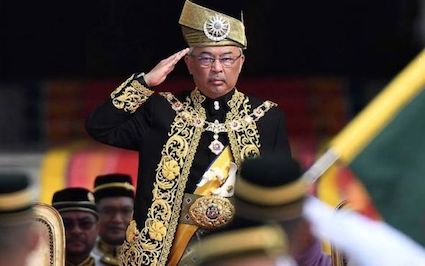No privileges, exceptions in Islamic justice, says Agong

(FMT) – The Yang di-Pertuan Agong, Sultan Abdullah Sultan Ahmad Shah, has reminded Muslims in the country that Islamic justice does not give any privilege or exception to anyone who commits wrongdoing, be it oneself, close friends, family members or parents.
He said the principle of Islamic justice does not allow any form of injustice, including to those unliked, adding that during Prophet Muhammad’s time, Islam’s dignity was raised as justice was upheld without favouritism.
“The principle of justice that is transparent also succeeds in developing a just, fair and prosperous society. The principle of justice according to Islam is upholding God’s trust,” he said when officiating the opening of the Pahang shariah court complex here.
“Based on the same principle, shariah courts must also be wise in using discretionary powers and to be always fair to all parties when sentencing, especially those involving family cases.
“If the law is not implemented consistently and fairly, justice will certainly not be achieved as the philosophy behind the enactment of a law would have been tainted, and as a result, the disadvantaged party would end up being victimised by those in power.”
Construction of the court complex, officially named Kompleks Syariah Al-Sultan Abdullah, began on June 22, 2015 with a cost of RM44.75 million and was completed on Sept 23, 2021.
Gracing the event were Raja Permaisuri Agong Tunku Azizah Aminah Maimunah Iskandariah, and Regent of Pahang Tengku Hassanal Ibrahim Alam Shah.
Also present were religious affairs minister Idris Ahmad, members of the Pahang state administration led by menteri besar Wan Rosdy Wan Ismail and Pahang chief shariah judge Abdul Rahman Md Yunos.
Sultan Abdullah also said the power to punish and pardon should not be used arbitrarily because one would be held accountable for it in the “afterlife”.
He reminded shariah judges to ensure cases are handled fairly and for judgments not to be delayed, besides calling on court officials and shariah lawyers to also facilitate the smooth running of court proceedings.
He also expressed hope that the concept of diyat (financial compensation to the kin of victims) that he had proposed over the past few years would be studied and implemented in Pahang and the country in general.
“I would also like to ask shariah judges to conduct a detailed study on punishments in the form of community service because there are offences that are not so serious. This should be considered so that they can serve the community.”
On the new court complex, the King expressed hope that it would provide helpful services to the community in addition to conveying and developing the teachings of Islam and improving the country’s shariah court institution.

